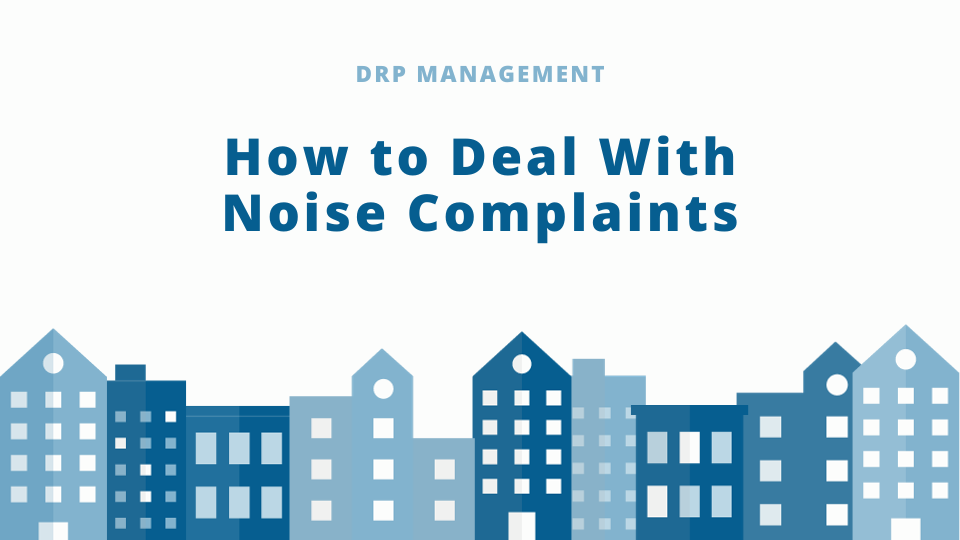
Apart from ensuring that your rental is habitable for your tenants, you must also know how to address tenant complaints. Among the common complaints you may encounter from your tenants, some of them are associated with noise.
As a landlord, you need to resolve these noise concerns immediately, knowing that other tenants have the right to quiet enjoyment of their dwelling. You must follow a proper procedure in order to resolve the complaint.
In this article, our team at DRP Management has brought together the necessary steps in order to take care of the noise complaints by the tenants in your rental property. Here are the steps you can follow when handling a noise concern:
Conduct an Assessment of the Complaint
It is unfair for a landlord to warn a renter of a complaint that later proves to be attributed to another tenant. The initial step is checking whether the complaint is valid or not, followed by reviewing if the case is a serious offense.
Before making any assumptions about the source of the noise, it is essential for you to conduct an independent investigation. There might be a lot of reasons leading to the complaint such as the complainant feeling overly sensitive on that occasion or someone else behind the ruckus.
After investigating and finding out that the noise was not caused by the reported renter, you can inform the complainant about the findings of your investigation. Also, you can question the other renters if they have experienced anything familiar.

Although renters are permitted to be noisy in certain scenarios, there is an acceptance level that they should not exceed. Here are some specific examples of events that may cause noise:
-
When a tenant hosts a party - celebratory events may include music, which is normal for frequent occasions. But if these events happen too often and last past midnight, the landlord can intervene to prevent the disruption of other tenants’ sleep.
-
The sound of footsteps - in a multi-residential building, tenants may hear heavy footsteps from someone jumping or dancing vigorously above them. The thudding sound can disturb residents living below resulting in a noise complaint.
-
The barking of dogs - sometimes, dogs can disturb the peace and quiet of residents through incessant barking. Although barking of dogs is normal, consistent barking can lead the landlord to look into the matter .
-
When loud fighting occurs - there may be times when tenants have disagreements, sometimes leading to a loud exchange. But, if the yelling becomes too frequent, the landlord must communicate with the residents to reduce the noise complaints.
Address the Valid Complaint
Once it’s clear that the noise complaint is legitimate, you must take action immediately keeping in mind that the consequence should match the gravity of the complaint.

Is it the first time for the renter to be subjected to a complaint? Did they host a party and were unable to control the level of noise created by some guests? If yes, giving a simple warning should suffice.
But, if the loud noises are recurrent and the renters take no steps to address the issue, you should inform them that an eviction will be contemplated. Keep in mind that this solution should be taken when all other warnings are ignored.
Resolve an Invalid Complaint
If the result of the independent research led to a different culprit for the noise, you must inform the person who reported the complaint with all the necessary details. You should provide detailed information and evidence of your investigation, letting the complainant know the real reason or cause of the noise.
Insert a Clause in your Rental Agreement
You can reduce noise complaints by including certain clauses in the lease covering noise conditions. The renters must follow the set guidelines in the lease agreement to avoid the consequences detailed in the contract. This way you can limit the potential noise complaints from your tenants and ensure long-term renters.
Examples of a Noise Clause
On Noise Disturbances
-
Tenants must maintain peace and quiet at all times and limit noise disturbances.
-
Tenants must avoid incidents of screaming, singing or playing loud music and be aware of the acceptable volume of appliances and other instruments.
-
Tenants must cooperate in keeping a peaceful environment, especially in complex buildings. They must agree to not engage in nuisance behavior that disturbs the privacy of the other tenants.
-
Tenants must not retaliate against the person who submitted the noise complaint. They must agree that if they violate the terms and conditions, they can be subjected to a fine or termination of their tenancy.
On Guests
-
Tenants must retain control over the behavior and conduct of their guests. They must observe these strict conditions when welcoming guests into their units:
-
Guests are restricted to two per night.
-
They are allowed to stay for three consecutive nights without a written approval from the landlord.
-
Guests and social events shall be strictly kept indoors, common areas cannot be utilized for personal gatherings.
-
If a person that is not included in the lease stays without prior landlord approval, it is labelled as unauthorized subletting which can be a ground for a fine or lease termination.
Bottom line
As a landlord, you must investigate a reported noise complaint of your tenant by remaining objective and evaluating if the issue is valid. After knowing the proper details, you can take the necessary steps to resolve the complaint.
Make sure that the disciplinary measure fits the degree of the offense. If the renter continues to create noise and does not heed the warnings, an eviction may be the final solution. You should also document the entire case to present proof whenever deemed necessary.
If you’re looking for reliable property management to address your rental property issues including the tenant complaints, contact DRP Management today!
